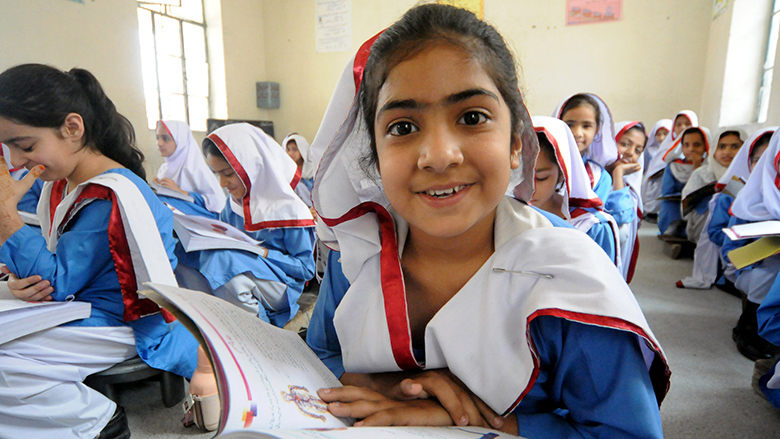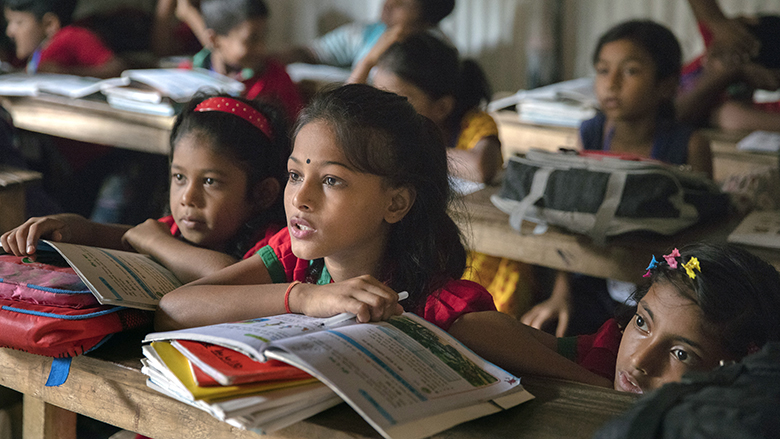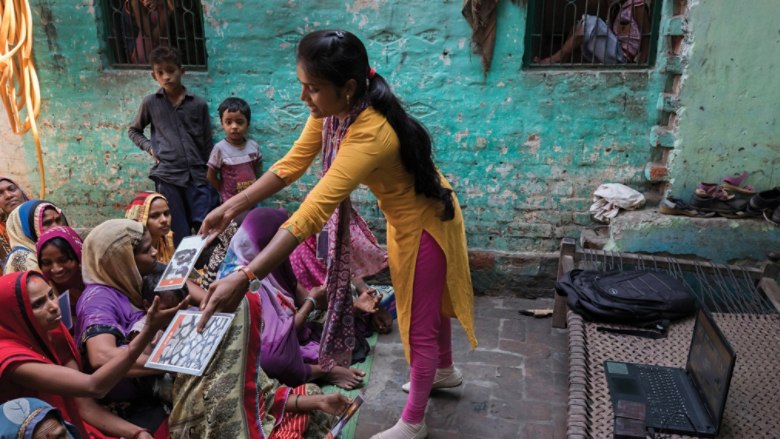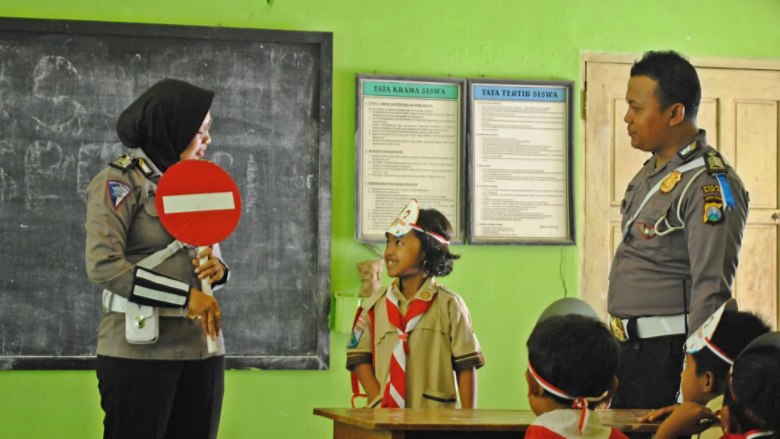Education

-
 Literacy PolicyE-Learning | Foundational Learning | For Government Officials
Literacy PolicyE-Learning | Foundational Learning | For Government OfficialsThis course builds the capacity of policymakers and practitioners to design and implement effective literacy policies for children. It consists of six modules covering key questions on how children learn to read, classroom practices, effective teaching materials, language of instruction, and the role of families and communities. The course concludes by highlighting successful large-scale literacy initiatives and the strategies behind their success.
-
Student Assessment for Practitioners and Policy MakersE-Learning | Data & Measurement | For Government Officials
This course provides a practical introduction to student assessment for policymakers and practitioners, emphasizing its role in achieving global education goals. It covers the importance of investing in student assessment, the key components of effective systems, and how to design and implement assessments. The course concludes with an optional evaluation for participants to assess their understanding of student assessment.
-
Operationalizing Disability Inclusion in EducationE-Learning | Inclusive Education | For Government Officials
This course offers practical guidance on implementing the four criteria set out in the World Bank Disability Inclusion in Education Guidance Note (DIEGN). Learners can participate in six self-paced sessions that cover a range of topics, including the rationale for adopting a systems-approach and how to apply the World Bank framework for disability inclusion in education, stakeholder engagement, context analysis, project design activities, monitoring and reporting, and a case study examining Rwanda’s systems-approach.
-
 Education FinanceE-Learning | Financing Education | For Government Officials
Education FinanceE-Learning | Financing Education | For Government OfficialsThis course provides foundational knowledge on the core elements of education finance. It addresses the importance of mobilizing adequate resources for education and the challenges associated with this process. It also explores tools and approaches that can improve the efficiency of education spending, as well as policies and measures that promote equitable use of resources. Additionally, it introduces the theory and practice of using results-based financing (RBF) in education, which is covered in a separate course.
-
Results-Based Financing in EducationE-Learning | Financing Education | For Government Officials
The course provides valuable insights and frameworks for the effective use of Results-Based Financing (RBF). The course is organized into three modules: an introduction to RBF in education, guidance on conducting RBF diagnostics and selecting appropriate RBF approaches, and instruction on designing an RBF intervention in education. The primary focus is on institutional RBF approaches, such as performance-based loans and contracts, rather than individual incentives like teacher incentives or cash transfers.
-
Capacity Building for Learning and Development ProfessionalsE-learning and Face-to-Face | Adult Learning | For Learning and Development Professionals
Grow Learn Connect, delivered by the International Finance Corporation, is a program for learning and development professionals in emerging markets. It offers access to a repository of tools and resources to help learning and development professionals grow their businesses and improve their services to MSMEs and other clients. Grow Learn Connect resources include publications, trainer certifications, and capacity-building courses organized around the training project lifecycle: assessing performance needs, designing curricula and learning experiences, and facilitating and supporting learning.
-
Supporting Higher Education Institutions in Improving Graduate EmployabilityE-Learning | Foundational Learning | For Government Officials and Private Sector Leaders
International Finance Corporations’ Vitae program helps higher education institutions boost graduate employability by aligning educational outcomes with labor market needs. Through its 360° Assessment, Vitae identifies program strengths and gaps, provides benchmarking against global standards, and offers tailored advisory support. By enhancing employer engagement, career services, and curriculum relevance, Vitae enables institutions to better prepare students for workforce success.
-
Disability Inclusion in Education (Module 1)E-Learning | Inclusive Education | For Government Officials
An estimated 1.3 billion people worldwide live with significant disabilities, yet learners with disabilities still face barriers to full participation in education. This module builds capacity to mainstream inclusive education and applies a twin-track approach to support learners with disabilities in general education systems. It includes two parts, lasting about three and a half hours, and offers curated resources for continued exploration.
-
Disability Inclusion in Education (Module 2)E-Learning | Inclusive Education | For Government Officials
Module 2: Disability Inclusion in Education provides participants with foundational knowledge on disability inclusion, with a particular focus on mainstreaming inclusive education and implementing a twin-track approach. This ensures that learners with disabilities can access and thrive in general education settings while receiving the support they need. The module explains key concepts and models that support the design, implementation, and evaluation of disability-inclusive education programs. It includes two parts, lasting about three and a half hours, and offers curated resources for continued exploration.
-
Designing for Impact: Optimizing Investments in Physical Learning EnvironmentsE-learning | Physical Learning Environments | For Government Officials |
This course addresses the challenges of outdated and inefficient Physical Learning Environments, especially in low- and middle-income countries. Using the RIGHT+ framework, it equips participants with tools to design spaces that are resilient, inclusive, green, healthy, and effective for teaching and learning. The course includes four modules totaling about 2.5 hours of interactive learning and practical application.
-
 Measuring Early Childhood Development OutcomesE-learning | Physical Learning Environments | For Government Officials
Measuring Early Childhood Development OutcomesE-learning | Physical Learning Environments | For Government OfficialsThe goal of this module is to help senior policymakers understand the reasons for measuring early childhood development (ECD) outcomes, what specific aspects of ECD should be assessed, and the methods for doing so within country context, all grounded in the principles outlined in the course. The module explores why it is important to measure ECD outcomes, identifies the key domains and indicators that should be evaluated, and discusses approaches to measurement.
-
 Building Effective Early Learning SystemsE-learning | Early Childhood Education | For Government Officials
Building Effective Early Learning SystemsE-learning | Early Childhood Education | For Government OfficialsThe goals of this course are to explore a systems-based approach to coordinated policy, programming, and action in early learning, to examine how different actors can collaborate to turn early learning goals into reality, and to identify common challenges faced by early childhood education (ECE) systems. The topics covered include coordinated approaches to early learning policy, planning, and design; strategies for expanding access and improving quality in ECE; methods for setting realistic objectives, targets, and timelines to achieve early learning goals; and lessons learned from cross-sector coordination in real-world country cases.
-
Learning Through PlayE-learning | Early Childhood Education | For Government Officials
This course focuses on learning through play (LTP) and why it is important for children’s development. The course will discuss elements of LTP and play facilitation in parenting education and Early Childhood Education (ECE) settings along with the evidence base and practical examples from countries integrating LTP into their ECE system.
-
Measuring Early Childhood Education QualityE-learning | Early Childhood Education | For Government Officials
In this module, we will explore why and how to measure the quality of ECE in low- and middle-income countries (LMICs) and learn about one specific measurement tool called TEACH ECE. The goals of this course are to better understand why and how to measure the quality of ECE in your own context and to explore tools for measuring the quality of ECE in low- and middle-income countries as well as in your context and how they can inform policy and practice, with an in-depth examination of the Teach ECE tool.
-
 Quality Early LearningE-learning | Early Childhood Education | For Government Officials
Quality Early LearningE-learning | Early Childhood Education | For Government OfficialsThis course helps you explore the elements of quality early learning and prioritize strategies to improve quality in client countries. Through seven modules, you'll examine different aspects of quality—from learning environments to early childhood development (ECE) leadership and management. The content was developed by ECE research and implementation experts in various fields and adapted from Quality Early Learning: Nurturing Children's Potential, part of the World Bank's Human Development Perspectives series.
-
Teachers 101: Fundamentals of Teacher Policy CourseE-learning | Teacher Professional Development | For Government Officials
This course provides an overview of the challenges teachers face in LMICs and how the World Bank’s strategies for effective teacher policy (as detailed in the Successful Teachers, Successful Students Policy Approach Paper) can inform the design of system level polices to address these challenges. This course is also available in French
-
Leadership for Progress in Foundational Learning (LEAP): Better Data for Better LearningHybrid Program | Foundational Learning Crisis | For Government Officials
The Leadership for Progress in Foundational Learning (LEAP) Program is a 12-month global initiative for senior policymakers from low- and middle-income countries. It aims to address the foundational learning crisis by deepening leaders' understanding and equipping them with effective strategies. Participants learn to identify and adapt evidence-based solutions for education reform. The program also fosters peer networks and cross-country knowledge exchange. Ultimately, LEAP helps leaders enhance reform efforts and refine national education plans for greater impact.
-
Student Assessment for Policymakers and PractitionersE-learning | Student Assessment | For Government Officials
The latest global goals for education require countries to ensure that children are acquiring the knowledge and skills they need to be successful in life and work. Student assessment is a key tool in these efforts. This course offers a practical, step-by-step introduction to student assessment for policymakers and practitioners.
-
EdTechE-learning | EdTech | For Government Officials
This course is based on the World Bank EdTech strategy and its five core principles. It is designed to strengthen your ability to understand and apply key EdTech concepts, including defining the strategic purpose for integrating technology in education by asking why it is needed, designing EdTech policies that are scalable, replicable, and inclusive to ensure they benefit all learners at scale, empowering teachers through the development of digital skills and effective pedagogical practices, and engaging the broader ecosystem of EdTech stakeholders to foster collaboration and innovation.
-
Introduction to Inclusive EducationE-Learning | Inclusive Education | For Government Officials
Do you know what is meant by full inclusion in education? The module focuses on the World Bank's approach to inclusive education through its four guiding principles, understanding key inclusive education concepts, systems and twin-track approaches, and provides concrete examples of working in diverse contexts with marginalized and minority learner groups.
-
Africa Skills for Jobs Policy AcademyE-Learning | Job Creation | For Government Officials
The Africa Skills for Jobs Policy Academy is a learning and exchange platform for policymakers and partners working to tackle Africa’s skills and jobs challenges. It emphasizes the role of TVET and national skills systems in creating more and better jobs. Participants gain access to evidence-based strategies, peer learning, and practical tools to strengthen skills development.
-
Micro-CredentialsE-Learning | Financing in Education | For Government Officials
This course provides an introduction to micro-credentials for higher education stakeholders. It explores their benefits, impact on enrollments, and the steps to design high-quality programs. Participants will learn how to develop micro-credentials that support both institutional growth and student success.
-
 Career Service FundamentalsE-Learning | Job Creation | For Government Officials
Career Service FundamentalsE-Learning | Job Creation | For Government OfficialsThe Career Service Fundamentals course provides an introduction to setting up and improving career services in higher education. It covers the key elements needed to establish a career services function and support student success. Participants will gain the knowledge to design services that enhance graduate employability and outcomes.
-
Introduction to Investing in ChildcareE-Learning | Childcare | For Government Officials
This is a self-paced course designed for practitioners, policymakers, and others who are interested in understanding the rationale for investing in childcare. The course is free, virtual, and can be completed at your own pace. The course explores why childcare matters, the scale of the global childcare challenge, and actions governments can take to ensure childcare is available, affordable, of decent quality, and responsive to the needs of all families. Throughout, the course highlights a variety of childcare provision models in diverse contexts with a practical focus on challenges, good practices, and lessons learned.












